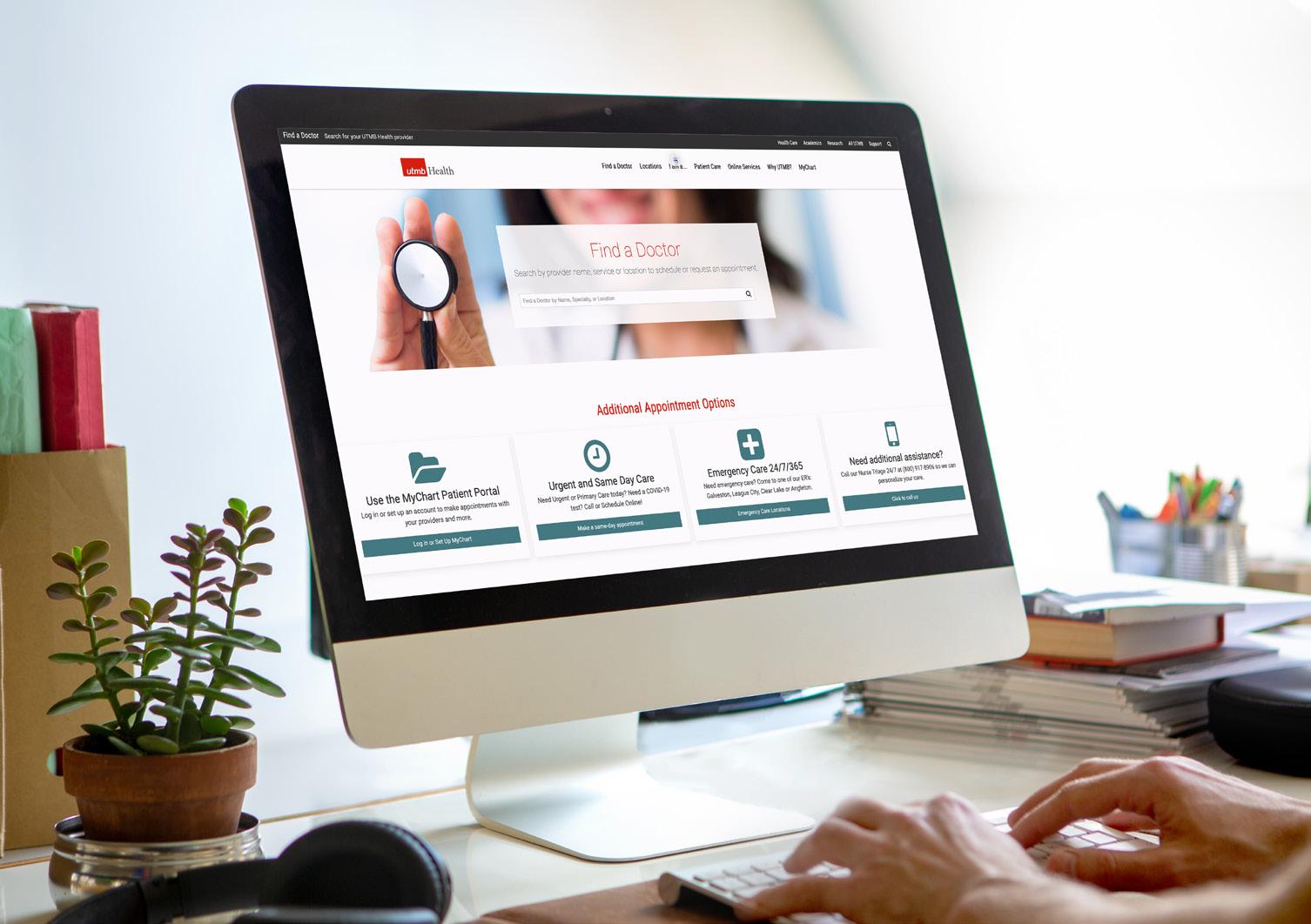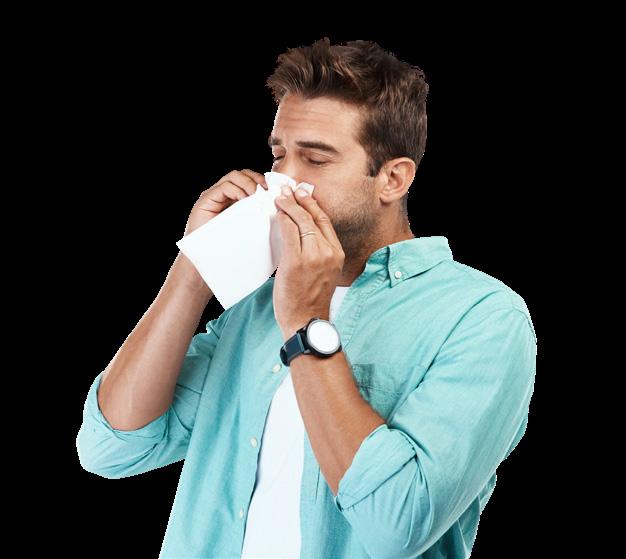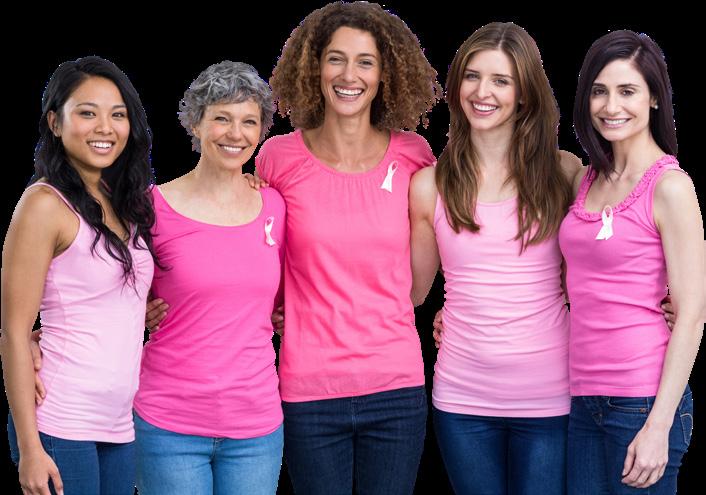2024-2025 PLANNER




What We Offer:
• Comprehensive Care: Spanning hospitals and emergency departments across four campuses, a network of primary and specialty care clinics, and urgent care services
• Convenient Access: Serving Galveston and Brazoria counties, the Bay Area, and Southeast Texas with extensive services close to where you live and work
Why Choose UTMB Health?
• Expertise and Compassion: We combine expertise with personal attention and compassionate care
• Trusted Provider: For over a century, we’ve been a major provider of health care for Texans and their families
Our Commitment to Texas:


• Health Care Workforce: Training the health care professionals of today and tomorrow
• Research and Innovation: Advancing the understanding and treatment of illness and injury
• Comprehensive Services: From primary and specialty care to urgent care clinics, we ensure access to a full system of care
Our Legacy and Impact:
• Historic Beginnings: Established in 1891 as the nation’s first public medical school and hospital under unified leadership
• Global Influence: A major academic health sciences center and renowned research enterprise
Educational Excellence:
• Diverse Schools: Including Medicine, Nursing, Health Professions, Public and Population Health, and Graduate Biomedical Sciences
• Innovative Institutes: Six institutes for advanced study, a major medical library, and numerous research facilities
Work
Cell
Email:
utmbhealth.com/back-to-school
doctors.utmbhealth.com
utmbhealth.com/findhelp
utmbhealth.com/locations
utmbhealth.com/health-blog
UTMB Operator
Galveston/League City: (409) 772-1011
Clear Lake: (832) 632-6500
Angleton Danbury: (979) 849-7721
24/7 Access Center & Nurse Hotline (800) 917-8906
MyChart Support Desk (409) 772-4278
Medical Records (409) 772-1965
Patient Support & Services (409) 772-4772
Health Resource Center (409) 266-7542

To all of our partners in area schools,
Welcome to the 2024-2025 academic year! As President of UTMB Health, I am excited to extend my warmest greetings to each of you. Your dedication to shaping young minds and fostering a love of learning is invaluable, and we are privileged to support you in this journey.
Recognizing the significant challenges and opportunities you face daily, we have created this planner to serve as a comprehensive resource to help you stay organized, set goals, and manage the demands of a busy academic year. Inside, you will find practical tools, inspirational content, wellness tips, and mandala designs for coloring—offering a creative outlet to promote relaxation and mental well-being.
At UTMB Health, our commitment to advancing health through education, innovative research, and comprehensive patient care underscores our dedication to serving the community. By providing this planner, we aim to offer you the support needed to excel both professionally and personally, embodying our belief in the power of education and innovation.
We look forward to supporting you throughout this school year and beyond.
With sincere appreciation,

Jochen Reiser, MD, PhD President CEO, UTMB Health System Professor, John Sealy School of Medicine John D. Stobo, MD Distinguished Chair
Pediatric & Adult Primary Care, Alvin
2020 East Highway 6
M–F: 7 a.m. – 6 p.m. (281) 585-2530
Adult & Geriatric Primary Care, Angleton
146 East Hospital Dr., Ste. 102
M–F: 7 a.m. – 5 p.m. (979) 864-3034
Pediatric Primary Care, Angleton Campus
146 East Hospital Dr., Ste. 106
M–F: 8 a.m. – 5 p.m. (979) 864-3034
Family Medicine, Angleton DBB
2309 West Mulberry St.
M–F: 8 a.m. – 5 p.m. (979) 849-6467
Family Medicine, Dickinson 2401 West FM 646, Ste. C
M–F: 8 a.m. – 5 p.m. (281) 614-1256
Pediatric & Adult Primary Care, Friendswood
128 West Parkwood Ave.
M–F: 7 a.m. – 5 p.m. (281) 482–5695
Family Medicine, PCP Galveston
400 Harborside Dr., Ste. 104, Entrance A
M–F: 8 a.m. – 5 p.m. (409) 772-2166
Geriatrics, PCP Galveston
400 Harborside Dr., Ste. 100, Entrance A
M–F: 8 a.m. – 5 p.m. (409) 772-3373
Internal Medicine, PCP Galveston
400 Harborside Dr., Ste. 105 & 107, Entrance A
M–F: 8 a.m. – 5 p.m. (409) 747-1883
Primary Care, PCP Galveston
400 Harborside Dr., Ste. 126, Entrance B
M–F: 8 a.m. – 5 p.m. (409) 266-0227
Pediatric Primary Care, PCP Galveston
400 Harborside Dr., Ste. 103, Entrance A
M-F: 7:30 a.m. - 5:30 p.m. (409) 772-3695
Family Medicine, Galveston
6710 Stewart Rd., Ste. 100
M–F: 8 a.m. – 5 p.m. (409) 744-4030
Pediatric Primary Care, Galveston
6416 Broadway St.
M–F: 8 a.m. – 5 p.m. (409) 772-3695
Pediatric Primary Care, Lake Jackson
208 Oak Dr. South, Ste. 400A
M–F: 7:15 a.m. – 5 p.m. (979) 285-2900
Adult Primary Care, League City Town Center
2660 Gulf Freeway South, Entrance A
M–F: 7 a.m. – 5 p.m. (832) 505-2200
Geriatrics, League City Town Center
2660 Gulf Freeway South, Entrance B
M–F: 8 a.m. – 5 p.m. (832) 505-2100
Internal Medicine, League City Town Center
2660 Gulf Freeway South, Entrance B
M–F: 7 a.m. – 5 p.m. (832) 505-2250
Pediatric & Adult Primary Care, South Shore
6465 South Shore Blvd., Ste. 500
M–F: 8:00 a.m. – 5:00 p.m. (281) 538-7735
Primary Care, League City Marina Bay
3023 Marina Bay Dr., Ste. 101
M–F: 8 a.m. – 5 p.m. (281) 549-9950
Primary Care, League City Bay Colony
2785 Gulf Freeway South, Ste. 165
M–F: 8 a.m. – 5 p.m. (832) 505-0139
Pediatric Primary Care, League City Bay Colony
2785 Gulf Freeway South, Ste. 2.200
M–F: 8 a.m. – 5 p.m. (409) 772-3695
Pediatric & Adult Primary Care, Texas City
10121 Emmett F. Lowry Expy
M–F: 7:30 a.m. – 5 p.m.
Adult: (409) 986-9686
Pediatric: (409) 938-8466
Pediatric & Adult Primary, Webster
17448 Highway 3, 2nd Floor
M–F: 8 a.m. – 5 p.m. (832) 505-1748
Pediatric Primary Care, Clear Lake
333 Texas Ave. North, Ste. 4300
M–F: 8 a.m. – 5 p.m. (281) 338-5437
Urgent Care, Alvin
2020 East Highway 6
M–F: 5 p.m. – 9 p.m. Weekends: 9 a.m. – 9 p.m. (281) 585-2530
Urgent Care, Angleton DBB 2309 West Mulberry St. Daily: 9 a.m. – 9 p.m. (979) 849-6467
Urgent Care, Galveston 6416 Broadway Daily: 9 a.m. – 9 p.m. (409) 266-0227
Urgent Care, League City Campus
2240 Gulf Freeway South, Medical Plaza One, 4th Floor Daily: 9 a.m. – 9 p.m. (832) 505-1234
Urgent Care, Texas City 10121 Emmett F. Lowry Expy Daily: 9 a.m. – 9 p.m. (409) 986-9686
Urgent Care, Webster 17448 Highway 3, 2nd Floor Daily: 9 a.m. – 9 p.m. (832) 505-1748
Emergency Room, Angleton 132 East Hospital Dr. (979) 848-9131
Emergency Room, Clear Lake Campus
200 Blossom St. (832) 632-7654
Pediatric Emergency Room, Clear Lake Campus
UTMB Health in collaboration with Children’s Memorial Hermann Hospital 200 Blossom St. (832) 632-7298
Emergency Room, Galveston Level 1 Trauma Center 901 Harborside Dr. UTMB Public Garage 2 (409) 772-9505
Emergency Room, League City
2240 Gulf Freeway South (832) 505-3144
UTMB Health offers a variety of specialty services. Visit www.utmbhealth.com for full list of services and locations.

Finding the right doctor who understands your unique needs has never been easier. At UTMB Health, we connect patients with experienced doctors who prioritize listening, comfort, and personalized care.

• Personalized Care: We understand the importance of finding a doctor who listens and connects with you on a personal level
• Expertise: Our network includes providers with diverse specialties and extensive experience, ensuring you receive top-notch medical care
• Convenient Search Tool: Use our Find A Doctor search tool to locate doctors, hospitals, and clinics tailored to your specific health care needs

*Monthly Health Tip
*National Immunization Awareness Month - Make sure you and your loved ones are up-to-date on all vaccines
*Breast Cancer Awareness Month - Encourage the women in your life to talk to their doctor about their screening options
*National Suicide Prevention and Awareness Month - Learn more about the Texas Child Health Access Through Telemedicine (TCHATT) Program at: www.utmb.edu/psychiatry/tcmhcc#TCHATT

*“Movember” a movement on men’s health awarenessEncourage the men in your life to make an appointment with their doctor today
*January Jump-start: Schedule Your Year of Wellness! - Don’t forget to schedule your health care appointments for the year
*National Heart Health Month - Do something good for your heart this month
*National Colon Cancer Awareness Month - Are you at risk for colon cancer? Talk to your doctor
*National Stress Awareness Month - Feeling stressed? Talk to your doctor for tips and best practices on how to cope in a healthy way
*National Stroke Awareness Month - Familiarize yourself with the signs of a stroke and what to do if someone around you has one
*National Alzheimer’s and Brain Awareness Month - Visit the UTMB Health Blog for Alzheimer’s Caregiver Resources: https://utmb.us/61p
*Summer Safety Awareness Month - From near-drowning events to firework burns, review best practices for what to do in certain common summer scenarios
*National Immunization Awareness Month - Encourage parents in your life to request an updated shot record for their children

When accidents, injuries, or sudden illnesses disrupt your day, UTMB Health is here to provide comprehensive care solutions tailored for educational professionals like you. Count on UTMB Health to be there for you with prompt, expert care whenever the unexpected strikes. Your health and well-being are our priority.

Urgent Care: Our Urgent Care Clinics offer convenient access to immediate treatment for minor illnesses and injuries, staffed by experienced health care professionals ready to address a wide range of medical needs.
Emergency Care: For more serious situations, our four dedicated Emergency Rooms, including a Level 1 Trauma Center at our Galveston Campus, ensure you receive expert care around the clock from board-certified physicians and emergency-trained clinicians.
Pediatric Emergency Care: Our specialized 24/7 Pediatric Emergency Room at our Clear Lake Campus is designed with children’s needs in mind, providing expert care when every moment counts.
Date/Type Name
Reason/Resolved

Establish a consistent morning routine to help set the tone for a productive and balanced day.
Did You Know?... By prioritizing self-care and setting positive intentions early in the day, you enhance your overall well-being and resilience.
Source: American Psychological Association, 2020

To ease back-to-school jitters for both teachers and students, UTMB Health professionals recommend establishing a good morning routine. Routines create predictability and familiarity and ease anxiety. For children, routines also offer a chance to try some independence and give them the opportunity to practice good self-care habits they can use as an adult. For educators, a consistent morning routine helps set a positive tone for the day and ensures you’re ready to support your students effectively. By preparing ahead of time, both educators and students can start their day feeling organized, calm, and ready to tackle whatever comes their way.

When planning your morning routine it’s important to do two things:
1. Take into account the needs of you and your child(ren)
2. Start the night before
Ways you can prepare the night before:
1. Lay out outfits for the next day
2. Plan breakfast
3. Consider your FULL schedule for the next day, to ensure you have anything extra you’ll need for before or after school and work
“Teaching is not a profession; it’s a passion.”
– Unknown
S M T W T F S 1 2 3
4 5 6 7 8 9 10
11 12 13 14 15 16 17
18 19 20 21 22 23 24 25 26 27 28 29 30 31
October 2024
S M T W T F S 1 2 3 4 5
6 7 8 9 10 11 12
13 14 15 16 17 18 19
Notes
September is National Suicide Prevention and Awareness Month
20 21 22 23 24 25 26 27 28 29 30 31 1 2 3 8 9 10 15 16 17 22 23 24 29 30
Students in school districts across Texas have access to mental health services through the Texas Child Health Access Through Telemedicine (TCHATT) Program. For schools in our region, members of the UTMB Psychiatry and Behavioral Sciences team provide the mental health care for these children and adolescents. Learn more at www.utmb.edu/psychiatry/tcmhcc#TCHATT
Day Autumn Equinox
“Teaching is the greatest act of optimism.”
– Colleen Wilcox
Proper hydration is crucial for overall health. Drink enough water throughout the day to keep your body functioning optimally.

Did You Know?... Proper hydration can improve physical performance, brain function, and mood. Drinking enough water helps regulate body temperature, lubricate joints, prevent infections, and deliver nutrients to cells.
Source: Centers for Disease Control and Prevention (CDC). “Water & Nutrition.” CDC.
In Texas, when summer comes to a close and school begins, the heat and humidity don’t magically disappear, so it’s important for everyone—especially those engaging in fall semester sports—to stay vigilant and mindful of how they’re feeling when practicing and playing outdoors. Signs and symptoms of heat-related illness, including heat exhaustion, include nausea, fatigue, headaches and muscle cramps.

To beat the heat and help prevent heat exhaustion, UTMB Health professionals have the following recommendations:
1. Take breaks in the shade and AC
2. Remove heavy pads and layers when cooling off
3. Build up your endurance and tolerance for the heat by starting with shorter periods of time outdoors then gradually increase it
4. Drink plenty of liquids
5. Replenish salts if you’re sweating a lot
S M T W T F S 1 2
3 4 5 6 7 8 9 10 11 12 13 14 15 16 17 18 19 20 21 22 23
Notes
October is National Breast Cancer Awareness Month
Early detection is key in the fight against breast cancer. Regular mammograms for women over 40 can significantly increase the chances of early diagnosis and successful treatment. Spread awareness and encourage loved ones to stay proactive about their breast health.
1. Arrive 15 Mintues Early
2. Do NOT wear any deodorant, powder, or lotion under your arms or around your breasts
3. Wear a two-piece outfit, not a dress
4. Bring a list of dates and locations of previous breast screenings or mammograms
5. Bring films and reports from previous imaging not performed at UTMB Health

There is no one-size-fits-all approach to breast health. Even the experts differ on some details related to breast cancer screening. In addition, every person has different risk factors that may need to be considered. You can never be too young to learn about the signs, symptoms and risks of breast cancer.

Here are some steps you can take to manage your breast health. You can begin this process as soon as you begin visits to the gynecologist – even in your teens or twenties:
1. Know your risk – Learn about your family’s cancer history
2. Know your breasts – Be familiar with what is “normal” for your breasts
3. Get screened – Talk with your health care provider on the appropriate time to begin screening
“Teachers plant seeds of knowledge that grow forever.”
– Unknown
S M T W T F S
1 2 3 4 5 6 7
9
November is Movember
Movember is dedicated to raising awareness about men’s health issues, including prostate cancer, testicular cancer, and mental health. As educators and staff, you play a crucial role in sparking conversations and encouraging the men in your life—whether colleagues, family, or friends—to take proactive steps in managing their health. Join the movement and help make a difference this Movember!
“To teach is to touch a life forever.”
– Unknown
Encourage the men in your life to prioritize their health. Regular checkups, a balanced diet, regular exercise, and mental health awareness are crucial for overall well-being. Men, take charge of your health and make wellness a priority!

Men are at higher risk for many serious diseases, such as heart disease, orthopedic injuries and certain cancers. The good news is that most of these are preventable with healthy lifestyle choices, preventive screenings and regular health check-ups. Good health starts with a little “preventative maintenance” on yourself. Establish a relationship with a primary care professional to improve your overall health and well-being at every stage of life.

Some important age-appropriate screenings for men include:
• Age 18 – 39: Regular health screenings, even if you feel healthy, that include screenings for blood pressure, cholesterol and diabetes along with needed immunizations
• Age 40 – 64: Continue with regular health screenings, begin colorectal cancer screening, review needed immunizations, lung cancer screening if you have a history of smoking, and prostate cancer screening
National Influenza Vaccination Week is Dec. 3-9
Getting your flu shot is the best way to protect yourself, your family, and your students from the flu. It’s not too late to get vaccinated and help prevent the spread of influenza in your community. Stay healthy and flu-free this season!
Find healthy coping mechanisms like meditation, deep breathing, or spending time in nature.

Did You Know?... Chronic stress can negatively impact your immune system, making you more susceptible to illnesses. Source:
The holidays can be a joyous experience for families and friends; however, they can also bring added stress and pressure to deliver perfect social media gatherings. Remind yourself that life is not perfect, and that the time spent together with friends and family is most important.
And with all the hustle and bustle of the holidays, it’s important to have a plan if an illness or injury strikes your family. Know where your local emergency room or urgent care clinic is located and which facility is best suited to the illness or injury you are experiencing. Having a clinic that has access to your health records and history can be beneficial to your treatment plan.

Here are some tips to navigate the holiday season and reduce stress:
• Don’t overschedule yourself, it’s OK to say no
• Set a budget for gift giving and be realistic
• Take care of yourself, get enough sleep, avoid overindulging in food and drink, and take time for yourself with a healthy habit like reading, playing music or using art
• Respect differences, not everyone has the same beliefs, focus on similarities with others
• Accept your feelings, if you are feeling overwhelmed or depressed, share those feelings with others
“The art of teaching is the art of assisting discovery.”
1
S
2
Notes January Jumpstart: Schedule Your Year of Wellness
Kick off the new year by scheduling your health care appointments and prioritizing your well-being. Staying proactive with your health helps prevent issues, ensures timely care, and promotes a
“Teaching kids to count is fine, but teaching them what counts is best.”
– Bob Talbert
When unexpected accidents or illnesses hit, it can be hard to know what to do. Should you call your doctor, find the nearest Urgent Care clinic, or go straight to the Emergency Room?
If you experience a health condition that does not require immediate attention, schedule an appointment with a UTMB primary care physician by calling our Access Center 24/7 at (800) 917-8906 or visiting the UTMB Health provider directory at doctors.utmbhealth.com. They will evaluate you and if needed, order appropriate testing, prescribe necessary treatment, or refer you to the right UTMB specialist to meet your needs.
If your needs are more immediate, but you’re not sure if you should visit an Urgent Care or Emergency location, scan the QR code below to guide your decision.
SEEK URGENT CARE FOR:
• Abdominal pain - mild
• Allergic reactions - mild to moderate
• Asthma attacks - mild to moderate
• Colds, coughs and flu
• Dehydration or heat exhaustion
• Ear and eye infections
• Fever*
• Minor burns
• Minor eye injuries
• Minor fractures
• Scrapes, minor cuts and bruises
• Sinus infections
• Skin infections and rashes
• Sore throat
• Sports injuries, falls, sprains and strains
• Urinary tract infections
• Vomiting and diarrhea

GO TO YOUR NEAREST ER FOR:
• Bleeding that will not stop
• Bone breaks, compound fracture
• Chest pains or stroke
• Fever in babies (under 8 weeks)
• Loss or change of vision
• Major cuts, lacerations
• Motor vehicle accidents
• Seizure without existing condition
• Serious burn
• Snake bite
• Head, spine and serious neck or back injury
• Sudden difficulty breathing*
• Sudden loss of consciousness
• Suicidal thoughts
• Unable to urinate*
• Vaginal bleeding if pregnant
• Vomiting or coughing up blood
*Call our nurse-staffed Access Center 24/7 at (800) 917-8906
SCAN TO READ MORE, OR VISIT:
• PATIENT CHARGES & CO-PAYS: Generally lower in an urgent care clinic compared to the ER.
• SPECIALIZED CARE: UTMB’s ER provides specialized care for more complex cases.
• AVAILABILITY: UTMB’s ER is open 24 hours a day, every day. Urgent care hours vary by site, but most are open after hours, including evenings, holidays, and weekends.
• WAIT TIMES: ER wait times can be highly variable and sometimes long. Depending on the complexity of cases being treated, waits for urgent care are often shorter.
• ADVANCED TECHNOLOGY: The ER offers a full range of advanced technology. Currently, urgent care does not provide ultrasounds, CT scans, or MRIs.
2
Wear Red Day
Day
Regular physical activity is essential. Try to move throughout the day, whether it’s taking short walks, using the stairs, or riding a bike.

Did You Know?... Regular physical activity can improve memory and cognitive function in both adults and children.
Source: Centers for Disease Control and Prevention (CDC). “Physical
Life always seems to be hectic, from juggling work to extracurricular activities for the kids or caring for aging parents, it can seem impossible to find time for taking care of our own health. But it’s important to prioritize yourself sometimes, not only for your overall well-being, but to improve heart health. Heart disease is a leading cause of death for both men and women in the United States, but the good news is you can do a lot to protect your heart and stay healthy.
Checking your blood pressure and cholesterol, quitting smoking and getting enough good-quality sleep are important for a heart-healthy lifestyle. When we take care of our hearts as part of our routine self-care, we set an example for those around us to do the same.

“Teaching is the art of shaping minds and inspiring hearts.”
– Unknown


“The beautiful thing about learning is that no one can take it away from you.”
– B.B. King
If the thought of getting a colonoscopy makes you grimace, you’re not alone. However, the procedure may not be as bad as you think—and it could save your life. Early detection and regular screenings are key to avoiding this deadly disease.
Here are six facts regarding the most common myths about colonoscopies:
Myth: I don’t have any symptoms, so I don’t need a colonoscopy.
Fact: Colon polyps and even early cancer can be growing in the lining of the colon without causing any symptoms. If cancer causes symptoms, it likely means it’s in more advanced stages. Early detection is key.
Myth: Colonoscopies are painful.

Fact: During the procedure, you will be asleep and comfortable with the help of safe sedative medications. The actual procedure takes about 15 to 30 minutes, and you may resume normal activities the next day.
Myth: Preparing for a colonoscopy is terrible.
Fact: Until recently, patients were asked to drink a gallon of preparation solution in one day in order to clean out the colon. Drinking that much liquid could be challenging. Now, it can be taken in a split dose—half the night before the procedure and half on the morning of the procedure, for example. However, your doctor can discuss and prescribe the most appropriate preparation method for you. As far as dealing with the salty taste of the prep solution, patients may mix it with ginger ale, Gatorade or other physician-suggested liquids to make it more palatable.
Myth: Colonoscopies only detect cancer, it doesn’t prevent it.
Fact: Colonoscopies not only detect early cancer (which is potentially curable), it also can remove precancerous polyps, avoiding subsequent development of cancer. It’s estimated that more than 75 percent of colorectal cancer can be prevented through early removal of polyps.
Myth: Colonoscopy is the only way to screen for colon cancer.
Fact: Colonoscopy is the preferred test for screening because it detects more cancers, examines the entire colon, and can diagnose and remove precancerous polyps simultaneously. However, other options, like stool tests, may be appropriate for certain situations. Consult your doctor to determine the best screening method for you.
Myth: Only men get colon cancer.
Fact: Both men and women have a similar risk of colon cancer, and it affects all races. The number one risk factor for colon cancer is age.
April is National Stress Awareness Month
Regularly express gratitude. It can positively impact your mindset and deepen connections with others. Ask, “What are you grateful for right now?”

Did You Know?... Practicing gratitude regularly can significantly enhance your mental health, improve your relationships, and increase overall happiness. People who express gratitude often report better physical health, reduced stress, and a more positive outlook on life.
Source: National Institutes of Health (NIH). “The Science of Gratitude.” NIH.
As a parent, advocating for your child’s health is essential to ensuring they receive the highest quality care. The first step is understanding its importance. Building strong relationships with health care providers, navigating the health care system, and empowering your child to advocate for themselves are key elements.
Parents play a vital role in their child’s health by being their advocates. This role allows you to ensure that your child receives the best possible care and support. Advocacy is crucial for your child’s overall health and development, as it ensures their needs are met and their rights protected. Active advocacy can prevent medical errors, improve care quality, and foster positive health outcomes by helping health care providers understand your child’s unique needs.

Establishing a strong relationship with your child’s health care providers is crucial for effective advocacy. Open and honest communication with doctors and nurses ensures your child receives the best care.
Prepare for appointments with questions and concerns, and don’t hesitate to ask for clarifications. Trust is built over time, so finding health care professionals who respect your input is essential. Regularly updating health care providers about your child’s health ensures comprehensive care and collaboration.
“Education
is not the filling of a pail, but the lighting of a fire.”

“A teacher affects eternity; they can never tell where their influence stops.”
– Henry Adams
Make sleep a priority. Aim for 7-9 hours of quality sleep each night to recharge and support your well-being.

Did You Know?... Getting 7-9 hours of sleep per night is essential for optimal health, improving mood, and enhancing learning. Source: National
A stroke, sometimes called a brain attack, causes brain tissue to die, which can lead to brain damage, disability and death. Strokes occur in one of two ways:
1. Ischemic stroke—When the blood supply to the brain is blocked
2. Hemorrhagic stroke—When a blood vessel in the brain bursts
According to the Centers for Disease Control and Prevention, stroke is a leading cause of death in the United States and is a major cause of serious disability for adults. Strokes kill nearly 150,000 of the 860,000 Americans who die of cardiovascular disease each year—that’s one in every 19 deaths from all causes.
Anyone, including children, can have a stroke at any time. Every year, about 800,000 people in the United States have a stroke—and about 1 out of 4 of those strokes are recurrent strokes. Having one stroke means you have a greater risk of having another (or recurrent) stroke. Several factors that are beyond your control can increase your risk for stroke. These include your age, sex and ethnicity. But there are many unhealthy habits, such as smoking, drinking too much alcohol and not getting enough exercise, that you can change to lower your stroke risk. Using tobacco products and having high blood pressure, high cholesterol, diabetes, or obesity can also increase your risk for stroke. However, treating these conditions can reduce your risk.
a
High blood pressure is the single most important treatable risk factor for stroke. Preventing, diagnosing and controlling blood pressure through lifestyle changes and medicine are critical to reducing stroke risks.
S M T W T F S 1 2 3
4 5 6 7 8 9 10
11 12 13 14 15 16 17
18 19 20 21 22 23 24 25 26 27 28 29 30 31
July 2025
S M T W T F S 1 2 3 4 5
6 7 8 9 10 11 12
13 14 15 16 17 18 19
20 21 22 23 24 25 26 27 28 29 30 31
Notes
June is National Alzheimer’s & Brain Awareness Month
Alzheimer’s disease affects over 6 million Americans and is the 6th leading cause of death in the United States. June is Alzheimer’s and Brain Awareness Month, dedicated to raising awareness about brain health, supporting those affected by Alzheimer’s, and advancing research toward a cure.
Source: The Alzheimer’s Association
Father’s Day
Keep learning! Read, explore new hobbies, and stay intellectually engaged. It’s good for your mind and overall well-being.

Did You Know?... Staying intellectually engaged by reading, learning new skills, and exploring hobbies can help maintain cognitive function and mental agility as you age. Lifelong learning is linked to lower risks of dementia and improved overall well-being.
Source: National Institute on Aging (NIA). “Cognitive Health and Older Adults.” NIA.
Discover essential resources with UTMB Health’s ‘FindHelp’ tool.
From financial assistance to food pantries, medical care and more, search for free or reduced-cost services available in our area and close to home.

How It Works:
• Search by ZIP Code: Enter a ZIP code on our website at utmbhealth.com/findhelp to access a wide range of local services
• Narrow Search with Keywords: For instance, search “transportation” to find specific listings that include contact information, hours of operation, and additional details for assistance in getting to appointments promptly

“It is the supreme art of the teacher to awaken joy in creative expression and knowledge.”
– Albert Einstein
Fireworks cause an average of 18,500 fires and approximately 9,100 injuries treated in U.S. hospital emergency rooms each year. These injuries include burns, eye injuries, and trauma. Celebrate safely by attending public displays and following local regulations to prevent accidents and protect your health.

“In learning, you will teach, and in teaching, you will learn.”
–
Phil Collins
Take control of your health with MyChart, a confidential and convenient online medical record tool. Accessible 24/7, MyChart allows patients to view lab results, immunization history, upcoming appointments, and billing information.

Key Features of MyChart:
• Access Anytime, Anywhere: View and manage your health information securely from the comfort of your home or on the go
• Secure Messaging: Communicate confidentially with your UTMB Health care team for non-urgent inquiries
• Medical Information: View test results, current medications, allergies, immunizations, and health issues stored in your electronic medical record
• Billing and Demographics: Review billing statements and update your personal information as needed
Important Note: MyChart is for non-urgent matters only. In case of emergency, please call 911 or go to the nearest emergency room.
Once the novelty wears off and the boredom sets in, screentime habits can quickly become an issue for school-age children during breaks from the classroom. Fortunately, the American Academy of Pediatrics walks parents through the process of making a family media plan. Here are some AAP guidelines that can help set those summertime boundaries:

• Check your children’s media use for their health and safety
• Stop use of devices or screens an hour before bedtime.
• Do not let your children sleep with devices such as smartphones
• Plan media-free times together, such as family dinners
• Decide on media-free, unplugged locations in homes, such as bedrooms
• Engage in family activities that promote well-being, such as sports, reading, and talking with each other
• Set a good example: Turn off the TV and put your smartphone on “do not disturb” during media-free times with your family
• Share your family media rules with caregivers or grandparents to help ensure rules are consistent
• Talk with your children and teens about online citizenship and safety
